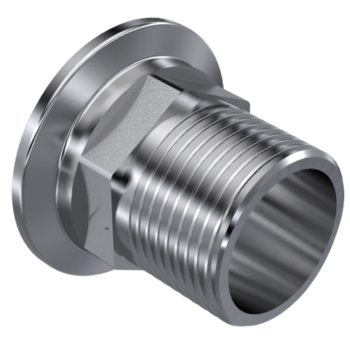Socket Weld Flange Suppliers
ASME B16.5 SWRF / SWFF Manufacturers
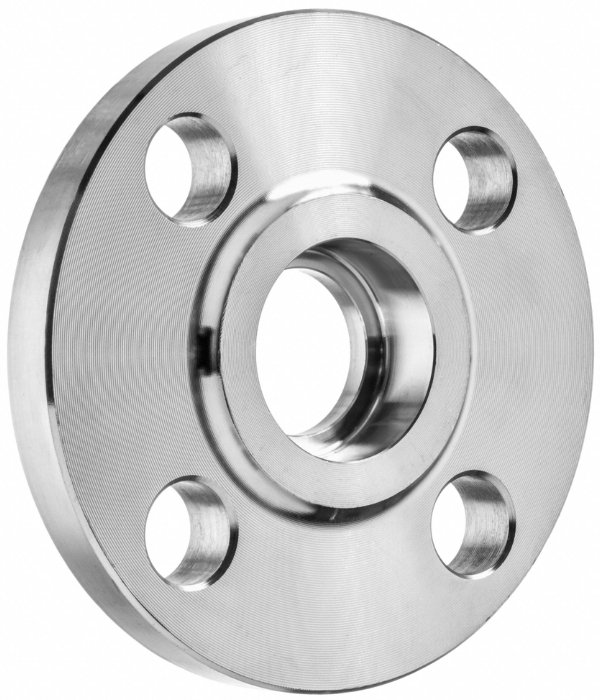
ASME B16.5 Socket Weld Flanges: Dimensions | Specifications | Material Grade | Standards | About SW Flange | All Product Types
Socket Weld Flanges are precision-forged components designed for high-integrity pipe connections in smaller diameter pipelines under high pressure. In this design, the pipe is inserted into a recessed area of the flange before welding, creating a strong, leak-proof fillet weld joint around the outer hub. These flanges conform to ASME B16.5 and ANSI B16.5 standards, commonly found in Class 150 to Class 600 pressure ratings and size ranges from ½″ NB up to 24″ NB.
Available in two popular variants — Socket Weld Raised Face (SWRF) and Socket Weld Flat Face (SWFF) — these flanges support different gasket sealing requirements and are preferred in critical piping systems such as refineries, power plants, marine systems, and industrial process lines. The flat-face version is generally used with cast equipment or non-metallic gaskets, while the raised face enhances gasket compression in high-pressure setups.
Nutech Overseas offers socket weld flanges manufactured from a wide selection of materials, including ASTM A182 F304/F316 stainless steel, ASTM A105 carbon steel, ASTM A182 F11/F22 alloy steel, and corrosion-resistant alloys such as Duplex (UNS S31803), Super Duplex (UNS S32750), Inconel, Monel, Hastelloy, and others. All flanges are supplied with test certifications, and optional NACE, IBR, and EN 10204 3.1/3.2 compliance is available.
Whether you're looking for weight chart details, dimensional standards, or best export price, we ensure unmatched technical support and fast global delivery. Our socket weld flanges are trusted by industries across the Middle East, Europe, and the USA for critical flow systems.
ASME B16.5 Socket Weld Flange Manufacturer | SWRF & SWFF Flanges in Stainless Steel, Carbon Steel, Alloy & Duplex – Ideal for High-Pressure Small Bore Piping Applications
For complete technical details, including dimensions, pressure rating classes, weight charts, sizes, tolerances, and material specifications of our ANSI B16.5 Socket Weld Flanges, please download the full Catalog PDF below.
Socket Weld Pipe Flanges in Raised Face (RF), Flat Face (FF) & Ring Type Joint (RTJ) – Class 150 to 600 – Available in Sizes from ½″ to 24″ NB
Technical Specifications of Socket Weld Flanges
| Specification | Details |
|---|---|
| Type | Socket Weld Flange (SW), Raised Face (SWRF), Flat Face (SWFF), Ring Type Joint (RTJ) |
| Design Standard | ASME B16.5, ANSI B16.5, ASME B16.47 Series A & B, MSS-SP-44, BS 4504, EN 1092-1, DIN |
| Size Range | ½″ NB to 24″ NB (DN15 to DN600) |
| Pressure Ratings | Class 150, 300, 600 (PN6 to PN160 in EN standard) |
| Face Type | Raised Face (RF), Flat Face (FF), Ring Type Joint (RTJ) |
| Flange Thickness | As per ASME B16.5 / B16.47 or EN 1092-1 dimensional standards and pressure class |
| Bore & Hub Design | Socket with counter bore for pipe insertion; ideal for small bore piping with strong connection |
| Welding Type | Fillet weld at hub and pipe intersection – ensures leakage resistance and strength |
| Surface Finish | Stock finish (3.2–6.3 μm), Smooth finish, Serrated concentric or spiral finish as per RF/FF |
| Gasket Compatibility | Spiral wound, Ring gaskets, Full face or raised face gaskets as per flange face |
| Drilling Template | Conforms to ANSI B16.5 or relevant standard drilling templates |
| Coating / Protection | Rust preventive oil, Black paint, Yellow transparent varnish, Hot-dip galvanized (on request) |
| Dimensional Tolerances | As per ASME B16.5, EN 1092-1, MSS-SP-44 or customer drawing/specifications |
| Testing & Inspection | Dimensional check, Hydrostatic test, PMI, Visual inspection, NDT (UT/MPI as required) |
| Certification | EN 10204 Type 3.1 / 3.2, IBR Approval, ISO 9001, PED 2014/68/EU, NACE MR0175 / ISO 15156, ISO 9001 |
| Application Industries | Oil & Gas, Petrochemical, Power Generation, Water Treatment, Pulp & Paper, Shipbuilding, HVAC, Offshore |
| Origin | Made in India (by Nutech Overseas) |
| Export Network | USA, Europe, and Middle East |
Complete Material Grade Chart - Class 150 Socket Weld Flange
| Material Category | Socket Weld Flange Grades |
|---|---|
| Stainless Steel Socket Weld Flange | ASTM A182 F304 / F304L / F304H, F316 / F316L / F316Ti, F310, F309S, F317 / F317L, F321 / F321H, F347 / F347H, F904L, ASTM A351 CF3 / CF3M / CF8 / CF8M / CF8C, DIN 1.4301, 1.4306, 1.4307, 1.4311, 1.4401, 1.4404, 1.4408, 1.4409, 1.4541, 1.4571, 1.4550, 1.4435, 1.4539 |
| Duplex Steel Socket Weld Flange | ASTM A182 F51 / F52 / F53 / F54 / F55 / F57 / F59 / F60 / F61, UNS S31803 / S32205 |
| Super Duplex Steel Socket Weld Flange | ASTM A182 F53 / F55 / F57 / F59 / F60 / F61, UNS S32750 / S32760 |
| Carbon Steel Socket Weld Flange | ASTM A105 / A105N, ASTM A350 LF2, ASTM A694 F52 / F56 / F60 / F65 / F70 / F80, ASTM A216 WCB, DIN 1.0460 / 1.0402 / 1.0619, Die Steel, Mild Steel |
| Alloy Steel Socket Weld Flange | ASTM A182 F5 / F9 / F11 / F12 / F22 / F91, AISI 4130 / 4140 |
| Nickel Alloy Socket Weld Flange | Nickel 200 / 201, ASTM B564 |
| Monel Socket Weld Flange | Monel 400 (UNS N04400), Monel K500 (UNS N05500), ASTM B564 |
| Inconel Socket Weld Flange | Inconel 600 / 601 / 625 / 690 / 718 / 783 / X750, ASTM B564 |
| Incoloy Socket Weld Flange | Incoloy 800 / 800H / 800HT (UNS N08800), Incoloy 825 (UNS N08825), Incoloy 925, ASTM B564 |
| Hastelloy Socket Weld Flange | Hastelloy C276 (UNS N10276), C22 (UNS N06022), C4, C2000, B2, B3, X, ASTM B564 |
| Alloy 20 Socket Weld Flange | Alloy 20 / 20Cb-3, Carpenter® 20, ASTM B462 |
| 254 SMO Socket Weld Flange | SMO 254 / 6Mo, UNS S31254, DIN 1.4547, ASTM A182 |
| Copper Nickel Socket Weld Flange | Copper Nickel 90/10 (C70600), 70/30 (C71500), UNS C71640, ASTM B61 / B62 / B151 / B152 |
| Copper Socket Weld Flange | TP1, TP2, T1, T2, C10100–C12300, C14200–C17200, C21000–C71520, including C10930, C11000, C11400, C12000, C12200, C26000, C28000, C33000, C44300, C70600, etc. |
| Brass Socket Weld Flange | Grades 3602, 2604, H59, H62, etc. |
| Aluminium Socket Weld Flange | Aluminium Grades 5052, 6061, 6063, 2017, 7075, etc. |
| Titanium Socket Weld Flange | ASTM B381 Gr.1 / Gr.2 / Gr.4 / Gr.5 / Gr.7, UNS R50250 / R50400 / R50550 / R50700 / R52400 / R53400 / R56320 / R56400 |
| Other Special Grades | Al6XN, Tin Bronze, Aluminium Bronze, Lead Bronze, Nimonic 75 / 80A / 90 |
International Flange Standards We Manufacture & Supply
Socket Weld Flanges are primarily designed for small bore piping systems. They are commonly available in sizes ranging from ½″ NB to 4″ NB, and rarely exceed 24″ NB. This limitation is because the flange's design requires the pipe to be inserted into a recessed socket and then fillet welded, which is ideal only for lower stress applications.
Similarly, the pressure rating is typically restricted to Class 600. Beyond this, the joint strength and fatigue resistance of socket welds may not be sufficient for high-pressure or high-temperature services, especially where thermal cycling or vibration is involved.
Another critical reason is inspection — socket weld joints are harder to inspect via radiography, making them unsuitable for critical systems where full weld integrity verification is required.
Key Points:
- Suitable for low-to-medium pressure pipelines (Class 150 to 600)
- Used in non-critical systems and non-corrosive environments
- Not recommended for high-cycle stress, thermal shock, or high-pressure piping
- Common in hydraulic lines, steam lines, and small bore utility lines
Socket Weld Flanges are widely utilized in high-integrity piping systems where leakage prevention and reliable connections are crucial. These flanges are ideal for applications where pipe alignment and compact design are important, particularly in high-pressure and non-corrosive environments.
They are typically found in industries like:
- Petrochemical and Refineries – for small diameter process lines where weld integrity is essential.
- Power Plants – in high-pressure steam and water lines.
- Shipbuilding & Marine Systems – where vibration resistance and tight sealing are needed.
- Hydraulic Systems – used in short-radius connections under consistent internal pressure.
- Pharmaceuticals & Food Processing Units – in clean piping systems where hygiene and leak-proof assembly are vital.
These flanges are best suited for piping below 2 inches, where threaded joints may fail under vibration or thermal expansion. Their compact design and weld strength make them a preferred choice for mission-critical pipelines.
The installation of a Socket Weld Flange involves a precise and clean welding process to ensure strength and leak-proof performance. These flanges are designed with a recessed socket into which the pipe is inserted before welding.
Here’s how the installation is typically done:
- Pipe Insertion: The pipe is inserted into the socket bore of the flange until it bottoms out, then pulled back slightly (~1.6 mm) to allow for thermal expansion during welding.
- Fillet Welding: A fillet weld is applied around the outer edge of the pipe at the socket joint. This provides excellent strength and a smooth flow path inside the pipe.
- Optional Back Welding: In critical applications or corrosive environments, an additional back weld or sealing weld may be done on the inner side.
Welding Method Used:
Socket weld flanges are generally installed using TIG (GTAW) or MIG (GMAW) welding processes, ensuring clean and accurate welds. The choice depends on the application, material type, and required weld quality.
Socket Weld Flanges are often chosen over threaded flanges in high-pressure systems due to their superior strength, sealing performance, and vibration resistance.
Key Differences & Advantages:
- Welded Joint vs. Threaded Connection:
Socket weld flanges use a fillet weld around the pipe, which eliminates the risk of leaks common with threaded connections, especially under pressure fluctuations or vibration.
- No Thread Corrosion or Loosening:
Threaded flanges can become loose or corroded over time due to pipe movement and media type. Socket welds are permanently sealed, making them ideal for critical lines.
- Better Flow Characteristics:
The internal bore of socket weld flanges aligns better with the pipe, resulting in less turbulence and pressure drop, improving system efficiency.
- Preferred in Compact Installations:
In systems with space constraints, socket weld flanges offer easier alignment and assembly, especially in instrumentation, hydraulic, or chemical dosing lines.
So, when it comes to safety, pressure integrity, and long-term performance, socket weld flanges are the smarter choice over threaded connections.
Yes, Socket Weld Flanges are compatible with both seamless and welded pipes, provided the pipe diameter falls within the applicable pressure and size range (typically up to 2" NB / 50mm).
Here's how compatibility works:
- With Seamless Pipes:
Seamless pipes are often used in high-pressure and high-temperature environments, where leak prevention is critical. Socket weld flanges ensure a leak-proof joint when welded properly on both the inner and outer side.
- With Welded Pipes:
Welded pipes can also be used with socket weld flanges, but care must be taken to ensure proper end preparation and clean welding surfaces to achieve a tight seal and structural integrity.
Pro Tip:
Socket weld flanges require a small expansion gap (usually 1/16") between the end of the pipe and the flange shoulder before welding. This prevents thermal expansion stress and weld cracking during service.
Final Note:
Always follow ASME B16.5 and relevant welding standards to ensure proper alignment, gap tolerance, and weld quality—whether using seamless or welded pipes.
Socket weld flanges are not typically recommended for highly corrosive or hygienic piping systems, especially when internal cleanliness is a priority — such as in food processing, pharmaceuticals, or ultra-pure chemical industries.
Why They May Not Be Ideal:
- Crevice Formation: The socket joint creates a small crevice where fluids can stagnate, leading to corrosion over time, especially in stainless steel systems.
- Cleaning Challenges: Unlike butt weld joints, socket welds do not allow full bore cleaning, making them unsuitable for industries that require sterilization or clean-in-place (CIP) systems.
When They're Still Used:
Socket weld flanges may still be used in:
- Non-hygienic process piping
- Hydraulic and utility lines
- Low-to-medium corrosive environments, when the material grade offers enough corrosion resistance (like using SS 316L or Duplex grades)
Recommended Alternatives:
For highly corrosive or sterile conditions, weld neck flanges or sanitary tri-clamp fittings are better suited due to their smoother, crevice-free inner surfaces.
Nutech Overseas is a globally trusted manufacturer and exporter of Socket Weld Flanges, supplying high-quality forged flanges to critical industries across various regions.
- United States (USA) – Supplying to oil & gas, petrochemical, and power plants in states like Texas, California, and Louisiana.
- Europe – Strong presence in Germany, Italy, Spain, France, Netherlands, and Poland, serving engineering and fabrication industries.
- Middle East – Regular exports to the UAE, Saudi Arabia, Qatar, Oman, and Kuwait, catering to EPC contractors and offshore pipeline projects.
We offer full certification, third-party inspection (TPIs), and custom packaging solutions tailored for international shipping requirements. Our forged socket weld flanges are in high demand for their compliance with ASME, ANSI, MSS-SP, EN, DIN, and BS standards.
Browse The Products
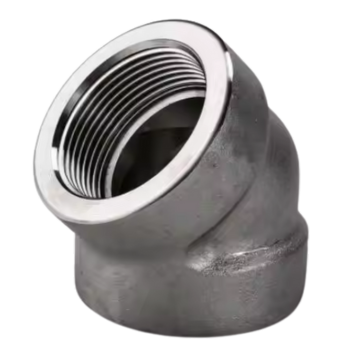
Forged Fittings
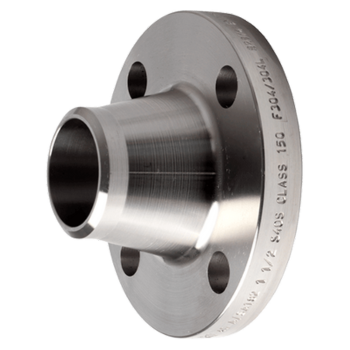
Flanges
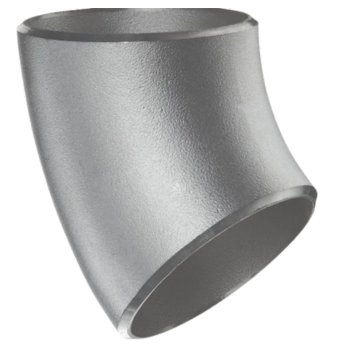
Buttweld Fittings
